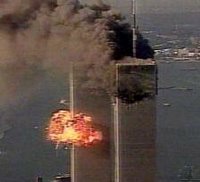Five Years Later
 On September 11 five years ago I was standing at Potzdamer Platz in Berlin explaining to a friend the tremendous changes there since the wall through Berlin had come down.
On September 11 five years ago I was standing at Potzdamer Platz in Berlin explaining to a friend the tremendous changes there since the wall through Berlin had come down.Suddenly there was a call from a friend in the UN building in New York. He had just from his room seen the second plane crash into the World Trade Center.
To me it was immediately obvious that al-Qaeda had succeeded. No other network had the resources to plan and execute an attack of this magnitude. And within minutes it was clear that a plane had also struck Pentagon.
The United States immediately declared itself at war, and to a large extent remain in that state today, with the Pentagon now talking about "a long war" and the President lately defining the enemy as "Islamic fascists".
As the Taleban regime in Afghanistan was protecting Usama bin Laden and the core of the al-Qaeda network, the attack to unseat the regime there was unavoidable. It was undertaken by the US, but it had the broad support of the United Nations.
That attack succeeded in liberating Afghanistan from the Talibans, but at the battle of Tora Bora Usama bin Laden and his core group managed to escape over the mountains. Since some years back it seems that virtually all traces of him has disappeared, although he delivers his videos and messages from his remote hideout.
But the core al-Qaeda organisation has been severely damaged since then. Although what is still there is likely to continue to plan large-scale attacks, its capabilities are severly reduced.
Today, it is more a symbol and an ideological inspiration for other groups, some of them originally helped by al-Qaeda, but many also new creations during the last few years taking the ideological lead from the fundamentalism from the mountain hideout.
Today, Usama bin Laden's most powerful weapon might be his videos and messages as he continues to evade capture.
In the last few years we have seen Europe coming into focus in a way that was not the case five years ago. Although the September 11 group had its origins in Hamburg, we have since them been made aware of the risk of terrorism being bred in the margins of the second- or third-generation immigrant communities in Europe. And their targets tend to be targets in our part of the world.
The fight against this terrorism isn't really a war in the classical sense. There is no clear beginning and end, there is no clear enemy and military instruments are certainly not the key when it comes to winning the battle. That they have declared war against us is no reason for us to elevate them to that level.
We still require to reinforce police and intelligence cooperation, and that is done as we are learning more and more.
But at the end of the day we are talking about a battle between values and ideas that to a large extent will have to be fought out within the society and culture of Islam. On our side, we must move ahead more desively with more genuine attempts to address some of the root causes that are leading young men into terrorism, be that different situations in the Middle East or the cultural alientation in the secular societies of Western Europe.
The greatest danger at the moment is hardly the one or the other terrorist attack - they will come - but that reactions to them - by supporters or those frightened into different reactions - will lead us into a more fundamental clash of civilisations. In this context, I fail to see that the designation "Islamic fascists" is particularly helpful.
We shall always be clear that what Usama bin Laden really seeks is such a more fundamental conflict, which would increase the possibility of the groups that he seeks to inspire to recruit and to attack. That is one of the reasonbs why we should be careful in the extreme not to let things slide into a direction that long-term plays into his hands.
Five years after September 11, I would guess that the assessment he is making in his cave is that while his al-Qaeda has been severly beaten, a number of events have inspired new although significantly less competent organisations, while tendencies towards a clash of civilisations have gradually become more pronounced.
The next five years must be different. Otherwise the risk of a really serious development is very clearly there.


<< Home